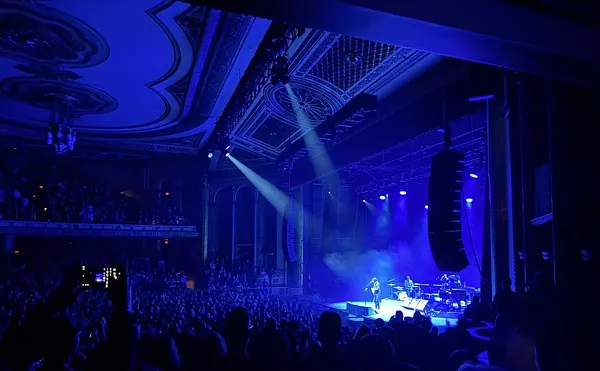
Audio By Carbonatix
[
{
"name": "GPT - Leaderboard - Inline - Content",
"component": "35519556",
"insertPoint": "5th",
"startingPoint": "3",
"requiredCountToDisplay": "3",
"maxInsertions": 100,
"adList": [
{
"adPreset": "LeaderboardInline"
}
]
}
]
The city may indeed be the home of techno, but ever since Miami's Luther Campbell started putting X-rated raps over sped-up electro bass rhythms to make raunchier, strip-bar-style Miami "bass," bass has been in the house in Detroit. Over the past two years, Detroit's bass scene has grown so much that, now, bass is the house. At virtually any dance club in the 313 area code (Legends, River Rock, Warehouse, B.C.s, etc.), on weekend nights, WJLB and WCHB DJs Gary Chandler, Wax Taxin' Dre, Fingers and Zap, respectively, are cutting, scratching and mixing all kinds of bass.
The spectrum of bass recordings comes from myriad sources: There are the vintage electro records of Afrika Bambatta and pre-techno Detroit acts like Cybotron at one end, and the 2-Live-crude Miami bass sound of Poison Clan at the other. When the DJs dip into house, funk and R&B favorites, they play them at 45 rpm to keep up the beat. Says WCHB's DJ Zap, John Fields, "Detroit's where faster dance music like electro and techno originated, so the bass here is naturally faster and more techno-sounding; it's just what we're used to."
The more "techno-sounding" Detroit stuff is the streamlined "techno bass" (also called "ghetto tech"), records that the week before their release were known only to patrons and dancers of the area's topless bars. That's where X-rated booty tracks are tested, where every table dance is a potential record release party for a new single. If the beats can inspire the polyrhythmic gluteal shaking of the area's finest exotic dancers, club and mix show DJs pick them up.
It ain't called "booty" music for nothin'. With its "if-this-don't-make-your-booty-move-your-booty-must-be-dead" vocal hooks, numbingly fast 170-beats-per-minute pace and wriggling synths, bass is the turntable folk art of urban experience, where strip bars meet street rhythm. White trash kids have their cock-rock metal &emdash; the inner city has its booty-centric bass. And just as jungle is the UK's urban rhythm collision of techno and reggae, bass is America's jungle, a raucous mix of hip-hop's boom and house's groove, all sped up so fast it becomes, like Detroit itself, something utterly its own.
Businesswise, bass has made Detroit its own, dominating the city's dance record market. Says Brian Gillespie, dance music buyer for Roseville's Record Time and co-owner of bass labels Twilight 76 and Databass, "Bass is looked down on by other DJs as the 'evil part of techno'; people are embarrassed to release it. But," he adds, "it sells a lot faster than techno."
House music producer Rick Wade, who puts out booty bass tracks as "Big Daddy Rick," explains it more succinctly: "A house record sells 200 copies a month; a bass record can sell that in two days."
"Bass just has that street quality to it. House is upscale. Techno's cliquey and more suburban, and the people who make it think of themselves as 'artists.' We're not artists. Bass is straight up about making people dance and getting paid."
Like the Joe Louis fist and Bill Bonds' hair, bass is everything great and terrible about Detroit; like the lap dances at the topless bars where bass tracks start out, bass is a lowest-common-denominator art form sold as a commodity.
But as its own chapter of Detroit music history, the bass scene owns the street, more than techno ever did, and now even more than hip hop does. As Craig Adams, aka DJ Assault, says in true DIY (do-it-yourself) fashion, "the street's stronger than any radio."
After all, where else can a DJ get a record to a strip bar one week, and have records and mix tapes flying out of a mom and pop record store the next? Marketing and promotion like this would take a national label months and millions to accomplish; even techno usually has to cross an ocean to get as well paid. But bass succeeds in its own big way, without ever leaving home, just by moving asses: Its own and its city's. Hobey Echlin writes about music for Metro Times. E-mail letters@metrotimes.com





